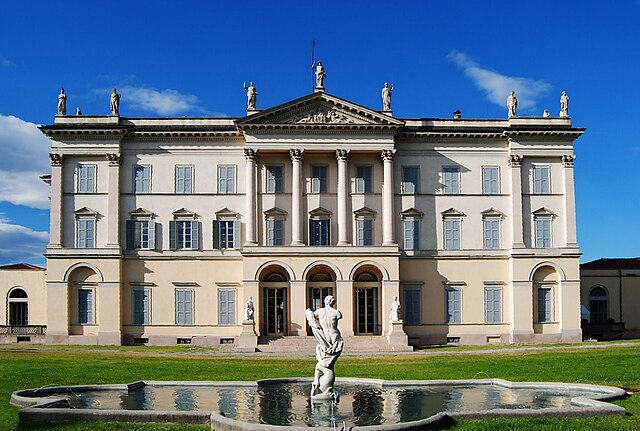The previous outing
We are currently on page 8.
[Milan, 24 septembre]
We finally get to Italy! Transports de joie, battements de coeur.
At least for the first day, I think, we can give Stendhal some sympathy in his enthusiasm; he comes into Milan tired from a long journey, and the Teatro alla Scala is the first proof of the worthwhileness of it all. And it is true that it was one of the greatest opera houses of the day, and like every great opera house, it is a bit of royal glory.

[25 septembre]
Unsurprisingly, he then makes sure to attend a performance at the «premier théâtre du monde», in particular a performance of La testa di bronzo. He is enthusiastic about it; in fact, he will not stop talking about it for most of his stay in Milan.
What I can find about this opera is interesting. La Scala had a contest in order to find new librettists, and in 1816, it chose Felice Romani, who was just starting out. (Felice Romani would become a very famous librettist.) For the music, it chose Carlo Soliva, also a novice, who was about twenty-five. Soliva was known for writing his operas in the style of Mozart, which will be why Stendhal will keep comparing him to Mozart. La testa di bronzo was wildly popular, with 47 performances in 1816-1817. And Soliva would never top that. Mozart not long afterward fell out of fashion and Soliva would go on to have a respectable career as a composer of chamber music and choral pieces. There is a video with excerpts from La testa di bronzo (and an analysis of the libretto), at YouTube, so you can get a sense of what Stendhal is geeking out over.
The reviewer at the Edinburgh Review finds Stendhal's ecstasies at Milan a bit excessive:
...when he gets to Milan, and sees the Scala, he is beside himself.... This is the first impression; but the second is still more violent; and he concludes a page and a half of rapture by saying that he is 'intoxicated and transported while he writes.' Night after night he goes to the same place, and his transports suffer no sensible abatement; for he goes on raving about the actors, actresses, decorations, and orchestra, the whole time of his stay at Milan.
[26 septembre]
In the brief mention of Desio (added for later editions), Stendhal is probably thinking in particular of the Villa Tittoni Traveris.

We get more of La Scala, and why it is the «premier théâtre du monde». The end of the entry, I think, involves a nice turn of phrase: «Le degré de ravissement où notre âme est portée est l'unique thermométre de la beauté, en musique». That's a very Romantic view, of course, the notion that the only measure of beauty is transport of the soul. And it raises interesting questions about the relative importance of the Romantic thermometer (emotional intensity) and the Classical measuring-stick (rational order). In any case, unless Stendhal is a faulty thermometer, everything about La Scala is very, very beautiful.
[27 septembre]
Stendhal goes through the story of La testa di bronzo, enthusiastically. It is perhaps notable that all of this is toned-down from what Stendhal originally published.
Is it a work of genius? Stendhal asks.
[28 septembre]
It is a work of genius, he insists. I don't know why it took him a day to answer the question, but presumably he put some thought into it.
«Cela plus beau comme les plus vives symphonies de Haydn», he says; one of the comparisons that the reviewer in the Edinburgh Review refers to in discussing how over-the-top Stendhal's raptures are. As noted above, we can give Stendhal the comparisons to Mozart; Soliva was a famously Mozart-ish composer. But his comparison to Haydn does seem to rest on a rather slender thread.
We are done with September, but not with Milan or La Scala. Or La testa di bronzo. Or Carlo Soliva. But fortunately, Stendhal will discover other things to talk about in Milan in October. I'll pick up on page 13 in two weeks.